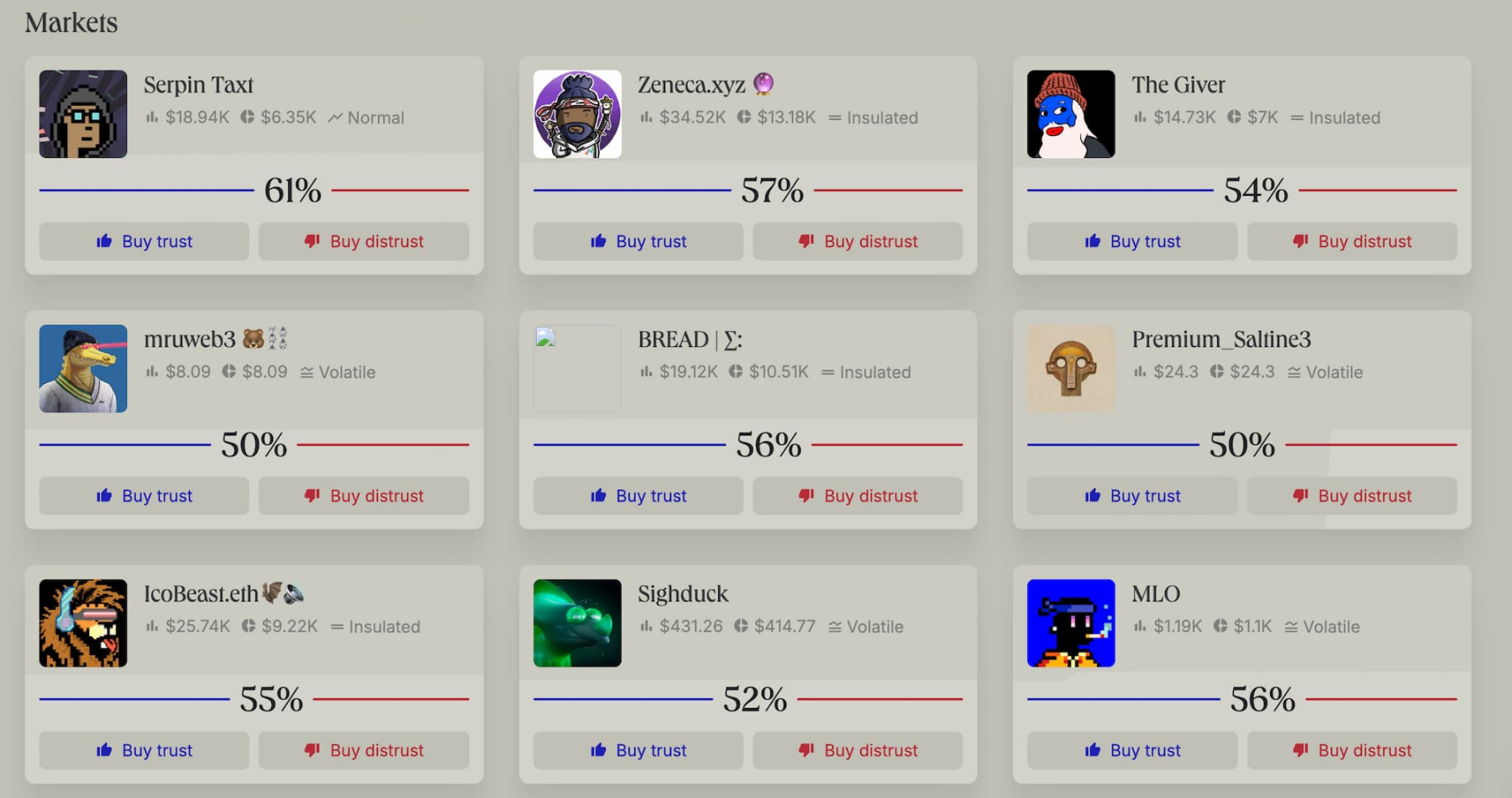从邀请制、担保、证明、削减机制到可信度量化,详解 Ethos 信誉体系核心设计。
撰文:KarenZ,Foresight News
加密世界常被比作「狂野西部」,充斥着混乱与无序。信任问题始终是阻碍行业进一步普及和成熟的关键障碍。针对这一痛点,Ethos Network 致力于在区块链上衡量信誉和声誉,为加密生态打造一个更值得信赖的环境。
正如 Ethos 所言,在现实社会中,信誉无处不在,简历决定工作机会、评分筛选医生、五星司机优先接单。但 Crypto 世界的信誉体系却近乎空白,缺少易于参考且清晰易懂的信誉系统,导致信任成本高昂、作恶零成本和欺诈频发。
而 Ethos 将填补这一空白。Ethos 的解决方案是链上信誉协议——通过去中心化机制生成可信度评分(Credibility Score),如同加密世界的「信用报告」,但完全基于开放协议和链上记录,推动加密生态向更加有序、成熟的方向发展。
Ethos 的核心设计
Ethos 协议通过一系列创新机制,结合社交权益证明(Social PoS),确保其信誉体系的可靠性、去中心化和抗 Sybil 攻击能力。以下是其主要功能和机制:
一、邀请制与女巫攻击防护
为了确保网络的抗女巫攻击能力(即避免通过创建大量虚假身份操控系统的行为),Ethos 采用了严格的邀请制。用户必须由现有 Ethos 账户持有者邀请才能创建自己的 Ethos Profile。这有效限制了恶意账户的泛滥。
邀请机制还引入了「信誉绑定」设计:邀请者和被邀请者在邀请 90 天内形成绑定关系,邀请者会获得被邀请者信誉分数的 20%,无论是正向提升还是负向下降。这意味着,若被邀请者因诚信行为获得高分,邀请者可分享其分数的 20%;反之,若被邀请者因恶意行为失分,邀请者也会相应损失。这种机制激励邀请者谨慎选择邀请对象,增强网络整体可信度。
二、链上可信度分数
Ethos 的核心功能是生成可信度分数(Credibility Score),一个量化用户链上信任度的数值化指标。评分基于以下链上活动和社交互动:
- 评论机制(Review):只有拥有 Ethos Profile 的人才能发表评论,可以为他人留下正面、中立或负面的简单评论。虽然单一评论影响较小,但大量评论的累积效应会显著改变用户的信誉分数。例如,多个高信誉用户的一致正面评价会大幅提升目标用户的可信度。
- 担保机制(Vouching):允许 Ethos 用户通过质押以太坊(未来会支持其他资产)为其他用户背书,表明对其信誉的信任。担保行为直接影响目标用户的信誉分数。担保机制的关键特点包括:
- 担保者需要质押一定数量的 ETH。质押金额越高,对目标用户信誉分数的正面影响越大。
- 质押的 ETH 会被锁定,作为担保者对被担保者信誉的财务背书。
- 担保者可以随时撤回担保,如果发现被担保者行为不当,撤回会导致目标用户信誉分数下降。
- 当用户 A 和用户 B 互相为对方担保时,系统识别为互相担保关系,对双方信誉分数的提升效果更显著。
- 削减(Slashing):旨在通过社区驱动的惩罚机制遏制不良行为。目前该机制还未上线。
- 任何 Ethos 参与者均可充当「举报人」,举报人需向验证者提供一定数额的奖励,以此请求人工验证。
- 验证者无论投票结果如何,都会获得相同的奖励,这在一定程度上避免验证者的。
- 若验证者支持举报人的指控,被举报者的质押资金将被扣除一部分,用于奖励举报者。单次 Slash 不超过 Ethos 质押总量的 10%。而如果举报人的指控不成立,则会受到惩罚。
- 被削减的资金直接从被举报者的质押金额中扣除,并转移给举报者。这种惩罚是唯一能在未经质押者同意的情况下强制扣除其资金的机制,但设计上应极少发生(通常先通过负面评价或取消担保等方式处理)。
- 受到惩罚的被举报者在 72 小时内不会再次因相同类型的举报而被惩罚,给予其一定的缓冲时间,也防止恶意连续攻击。
- Ethos 用户还能发起「社交削减」(Social Slashings),不涉及资金风险,而是影响参与者的可信度评分。
- Attest 机制(证明):允许参与者关联其他数字身份、社交网络资料和链上钱包,从而反映来自其他渠道的权威、声誉和影响力。证明本身免费,用户仅需支付所需的 Gas 费。已认证的账户和钱包会永久记录在链上。如果用户进行欺诈性证明(如关联不属于社交账户),将面临严厉惩罚:
- 财务惩罚:质押的 ETH(如果有)可能被没收。
- 社交惩罚:可信度分数大幅下降,可能触发社交削减。
三、Ethos Profile 展示
用户的 Profile 资料可以为社区和其他 dApp 提供透明、可验证的信任参考。用户也可保持匿名或使用化名(pseudonymity),无需暴露真实身份。Ethos Profile 包括可信度中心和可信度评分,并整合证明、担保、评论和削减机制的数据。其中,Profile 可信度中心展示了相关可信度线索的摘要,这些线索源自 Ethos 协议或关联钱包的链上活动,突出显示最具影响力的 Ethos 元素,如大额担保、备受瞩目的评价和主要的金融资产持有情况。
四、可信度分数如何计算?
通过对上述这些机制产生的社交互动数据的分析,Ethos 会生成一个数值化的 Credibility Score(可信度评分),并在 Ethos Profile 中展示。
而就可信度评分计算方式而言,评分算法会综合考量多种加权指标,这些指标涵盖各类链上行动。比如担保相关指标,包括担保数量、相互担保情况、担保金额、相互担保持续时间及违约情况;还有评论者或担保者的可信度评分、用户在 Ethos 上贡献的平均评级、证明账户的时长等。各指标权重并非线性,而且,指标和权重会依据可信度共识进行调整、增减,确保科学性和适应性。
评分范围及等级方面,评分范围为 0 - 2800,划分为 5 个等级。0 - 799 分代表不可信;800 - 1199 分表示存疑;1200 - 1599 分为中立;1600 - 1999 分是声誉良好;2000 - 2800 分则属于优秀。所有钱包和证明初始默认分数为 1200 分(中立)。
在治理方面,考虑到可信度评分的重要性,Ethos Labs 计划将评分算法的控制权移交给参与者,避免中心化影响带来的弊端。
Ethos 声誉市场
Ethos 还发布了声誉市场「Ethos Market」。Ethos Market 允许用户通过买卖「信任票」与「不信任票」来对个人、公司、DAO 甚至 AI 实体的声誉进行投机。每个市场绑定一个 Ethos Profile(关联以太坊钱包),反映目标对象的实时信誉评分。

初始状态为 50% 信任 vs 50% 不信任,价格随买卖动态调整。买入「信任票」 可以推高目标用户的信任评分,同时降低不信任票价格,反之亦然。因信誉无法在某一刻最终确定,市场持续波动,所以 Ethos Market 市场采取永续市场设计。
预测市场定价和流动性方面,Ethos Market 基于 AMM 智能合约,使用标准对数市场评分规则(LMSR)算法对两个相反的仓位进行定价。这与 Polymarket 使用的定价算法相同。
小结
Ethos 的目标是让信誉成为加密经济的默认要素,通过「社交权益证明」机制,将人类价值观与链上行为绑定,激励用户展现诚信行为,同时惩罚恶意行为者,从而推动 Crypto 世界朝着更加健康、有序的方向发展。此外,Ethos 协议还可集成至钱包插件、dApp 等,成为加密世界的通用信誉层,而非单一应用。
Ethos 的创新机制和理念为解决当前行业信任问题带来了新的希望。但与此同时,Ethos 也面临多重挑战:邀请制限制用户增长、评分算法需确保公平性、社区治理尚未成熟等。
免责声明:本文章仅代表作者个人观点,不代表本平台的立场和观点。本文章仅供信息分享,不构成对任何人的任何投资建议。用户与作者之间的任何争议,与本平台无关。如网页中刊载的文章或图片涉及侵权,请提供相关的权利证明和身份证明发送邮件到support@aicoin.com,本平台相关工作人员将会进行核查。




